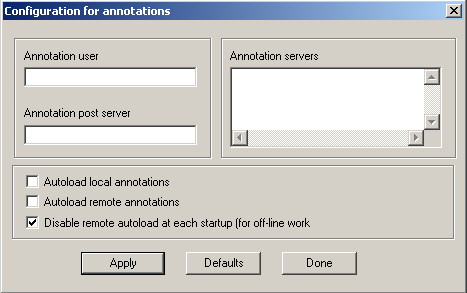Configuring Annotation Settings
You open the Configuration for annotations dialog by
choosing Configure from the Annotations
menu. The following figure shows the Windows version of this dialog:

The Unix version has a slightly different user interface, but the same
functions.
- Annotation user
- The author of the annotation. By default, Amaya uses the login name
of the user. This field enables you to change your user name to
something more meaningful.
- Annotation post server
- This setting defines the server to which the annotations are posted.
Local annotations are always saved to the local repository, and by
default, this setting is empty. The post server is not automatically
included in the list of servers, so you should enter the post server
name in both places.
- Annotation servers
- A list of servers Amaya should contact when looking for annotations.
You can specify one or more servers. The reserved server name
localhost tells Amaya to search the local annotations,
but does not necessarily mean that a local annotation server is running
(or it would show a complete URL ).
- Under Unix, the annotation servers are specified as a space separated
list. Under Windows, you can add a new server name by clicking in the
Annotations servers list, pressing the Enter key, and
then typing the server name . By default, this list is initialized to
localhost.
Tip:
To temporarily disable an annotation server, add a "-" char before its
URL. Amaya will ignore it.
- Autoload local annotations/Autoload remote
annotations
- Whether Amaya should request annotations automatically (by querying
the annotation server) every time you browse any URL. If it is not
checked, then you can manually choose Load annotations
from the Annotations menu.
Note:
If you check the Autoload remote annotations option,
you may experience a delay in resolving the DNS name of the annotation
servers. By default, both these options are turned off.
- Disable remote autoload at each startup (for offline
work)
- Whether Amaya should reset the autoload remote
annotationsoption at launch time. This option can be useful if
you are working offline, but still want to autoload the local
annotations as well as the remote ones.
See Also:




